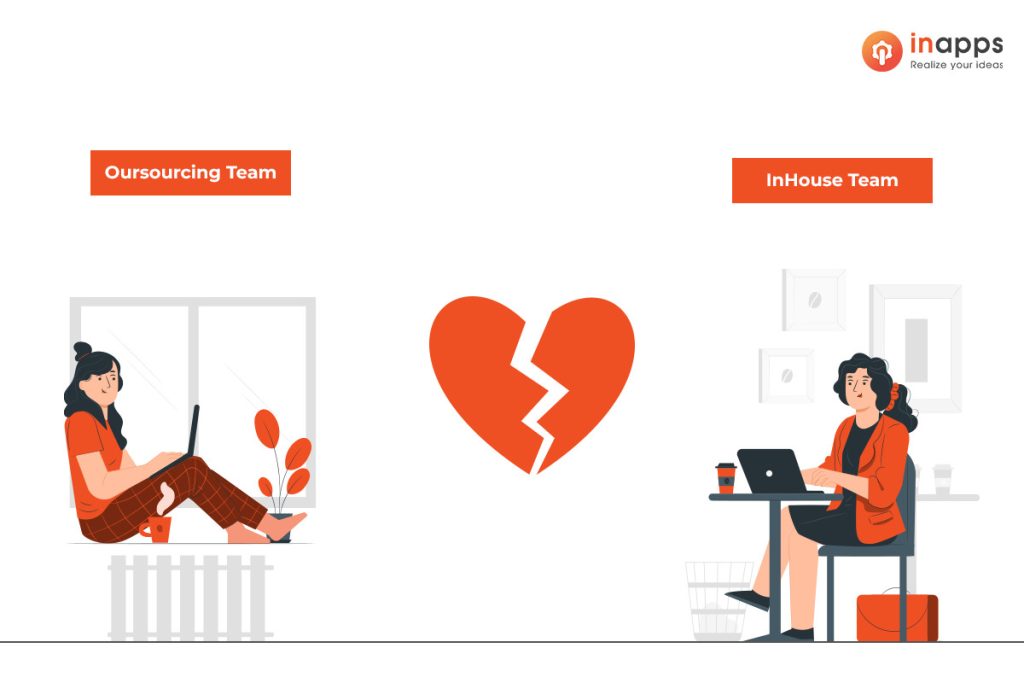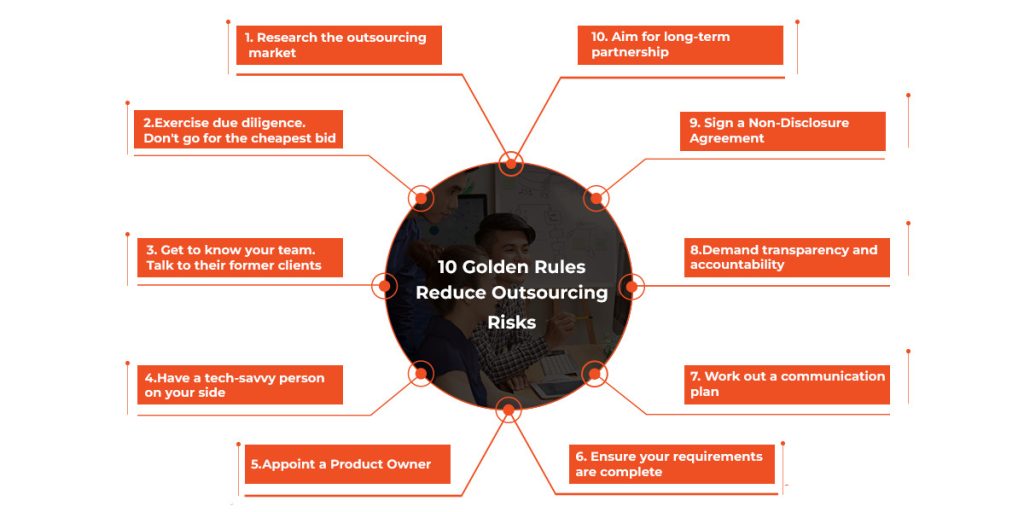- Home
- >
- Offshore News
- >
- Managing Risks of Outsourcing Software Development
1. Understanding Outsourcing and Its Benefits
Outsourcing in software development means hiring an external team or company to handle certain tasks or projects instead of using your in-house team.
For example, you’re running a tech company that specializes in finance software, but wants to create a fitness app. Instead of hiring new developers, training your existing team in mobile app development, or redirecting your current team’s focus away from your main products, you partner with an external company that specializes in fitness app development.

By turning to software outsourcing, businesses can gain big benefits. For one, it can save money. Instead of hiring new full-time employees, which involves salaries, benefits, and training costs, companies can pay just for the work they need when they need it.
This approach also offers flexibility. A business can quickly scale its team up or down depending on the project at hand, accessing a wide pool of global experts specialized in different areas. This way, companies can ensure they’re always using the latest technologies and methodologies without having to invest in extensive training for their current staff.
In short, outsourcing software development not only helps businesses manage costs effectively but also enhances their ability to adapt and innovate in a fast-paced technological landscape.
2. Common Risks of Outsourcing Software Development and How To Reduce Them
Even though outsourcing software development can save costs and offer expert help, it’s important to be aware of the risks involved. In this section, we’ll explore the key risks of outsourcing software development and how to avoid them
2.1. Broken promises
One significant risk of outsourcing software development is the reality of broken promises. Many outsourcing companies boast teams of highly experienced and skilled developers, but these assurances can sometimes fall short of delivering your project as envisioned. This discrepancy raises valid concerns about the outsourcing partner’s ability to fully understand and execute your requirements, potentially leading to project delays, budget overruns, or incomplete work.

Solution
When tackling the risks of outsourcing software development, it’s crucial to scrutinize the outsourcing company’s website for signs of their expertise. A well-designed site suggests they can deliver quality work. Delve into their case studies too, as they highlight the company’s ability to navigate common problems with outsourcing software development.
Independent reviews on sites like GoodFirms and Clutch are great places to start as they offer unfiltered insights into their track record, providing a broader view of their capabilities and reliability.
If possible, meet the team in person or virtually to get a sense of who they are and how they operate. Monitoring the company’s involvement in the tech community through social media and industry events can give you a clue about their commitment to staying updated and engaged in their field.
Hire a pilot or MVP to assess the vendor’s technical skills, attitude, and people skills. A small amount of work ensures you don’t waste too much time and money on incompetent contractors.
2.2. Unsatisfactory Quality
Solution to counteract this risk of outsourcing software development
- There can be no compromises when it comes to quality. Make sure the software contractor meets the same high-quality standards as your own company. Check that they understand the role of QA in the project and use code review.
- Look at the technology stack of the software outsourcing vendor (e.g. frameworks, libraries, test and monitoring tools). Do they just focus on manual UI testing or can they offer the full range of QA services including performance testing, API testing, test documentation creation, and extensive QA automation?
- The contractor uses cutting-edge DevOps practices to accelerate development and maintain high quality (e.g. continuous integration and deployment, containers, source control systems, build automation tools, etc.
- Having a technology expert by your side: You must have at least some technical knowledge. Accept this responsibility and you will have a sophisticated solution that meets your business needs.
View more: How to get out of trouble with a bad development team?
2.3. Lack of domain experience

Solution
- Gain insight into the contractor’s domain experience. You can find this information on their website or request it directly (along with case studies as evidence of your experience).
- Add a product discovery phase/workshop before development begins. Wireframes, use cases, and business processes – a blueprint for your technical product specification. In addition, any gaps in the technical expertise and soft skills of the provider are revealed in the workshop. If you notice red flags, just keep your blueprints going from competent developers. This way, with a small initial investment, you can be protected from many risks in the future.
2.4. Hidden Costs
Solution
- Make sure that you have clear requirements before starting the collaboration (alternatively, organize a workshop to collect requirements). This will help you define the scope of work and reduce the possibility of unexpected costs.
- Familiarize yourself with the provider’s pricing models. Different companies can have different ideas about fixed-price contracts and non-fixed-price contracts. Choose a participation model that best suits your project.
Sign a Service Level Agreement (SLA) that lists the services provided by the web development outsourcing company and their costs. They know all of the hidden costs like integrations, hosting, site visits, overtime, and buying the add-ons/hardware/software required.
View more: Hidden costs of mobile app development
2.5. Loss of control
For any manager, losing grip on a project represents a worst-case scenario. You understand your business intimately, recognizing when to closely supervise your team and when they have the autonomy to make decisions. Similarly, establishing a relationship with a software outsourcing partner hinges on mutual trust.
However, this dynamic introduces one of the risks of outsourcing software development: the challenge of maintaining control over the project’s direction and outcome while working with external teams. This balance between oversight and trust is critical in avoiding outsourcing software development risks effectively.
Solution
- Ask yourself which aspects of development you would like to delegate before starting the cooperation.
- Write a detailed management plan. Identify key stakeholders, their responsibilities, and contacts; Establish processes to cope with changing requirements.
- Manage the project together with your partner. Appoint a Product Owner who is responsible for communicating with the development team and prioritizing their work.
- Set up the appropriate communication channels. Daily emails are great, but regular video calls, on-site demos, Slack channels, and access to bug-tracking/project management software are very important.
Follow the development process. If you abandon your project, the end product will likely differ from what you expected. Feedback on the various phases is essential for reducing future risks of outsourcing software development.
2.6. Lack of Communication
Grant Thornton’s International Business Report highlights a crucial insight: 88% of those surveyed agree that effective communication is essential for successful outsourcing. Challenges such as differing time zones, language barriers, cultural nuances, and the absence of in-person meetings can significantly influence the project’s success.
Moreover, opting for short-term partnerships can further complicate communication. In such scenarios, the vendor has limited opportunity to fully grasp your requirements or adjust to your preferred style of communication, intensifying common problems with outsourcing software development

Solution
To counteract this outsourcing risk, you must assess the team’s English proficiency and their understanding of your requirements during the negotiation phase. Prioritize direct communication through face-to-face or online meetings to catch any language barriers early on.
Additionally, confirm the software provider’s capability to work within your time zone; a difference of more than 8 hours often necessitates a significant adjustment in working schedules. For smoother operations, consider code deployments to be reviewed during your morning, enhancing workflow efficiency. To address potential delays caused by time zone differences, arrange for overlapping work hours or regular morning check-ins to quickly resolve any issues that arise.
Also, consider cultural differences that might impact communication styles and project management approaches. Regions like Vietnam, India, China, and Southeast Asia may prefer clear instructions and a waterfall methodology, while teams from Latin America and Eastern Europe might lean towards the flexibility and autonomy found in Scrum practices. Acknowledging and adapting to these cultural differences can significantly prevent possible risks of outsourcing software development.
2.7. Lack of experience with remote team management
Hesitation to outsource software development can often stem from a lack of experience in managing remote teams. This becomes particularly risky when both you and the software outsourcing partner are collaborating remotely for the first time. An inexperienced developer paired with a client new to remote team dynamics is a mix that can lead to project setbacks.
Solution
To overcome this, it’s essential to select a partner who is adept at remote operations. Top-tier software outsourcing companies have refined their business processes to cater to clients located in different parts of the world. They bring valuable experience in managing projects across various time zones, bridging cultural gaps, and employing effective communication strategies for successful collaboration.
Additionally, requesting that your outsourcing partner provide training or guidance for your in-house team on best practices for remote collaboration can further smooth the transition and ensure a productive working relationship. This approach not only prepares your team for current projects but also equips them with skills that are increasingly relevant in today’s global work environment.
View more: How to lead your offshore development team efficiently?
2.8. Intellectual property problems

Solution
- Find out if the IT outsourcing company has experience in handling sensitive data (especially in the financial, medical and government sectors). Ask about their privacy practices.
- Sign a non-disclosure agreement (NDA) before cooperating. Check local intellectual property laws. If necessary, hire a legal advisor with experience in software outsourcing.
- You might worry that the vendor will use the knowledge of your system to develop a competing product. This risk can easily be mitigated with a non-compete clause.
2.9. High turnover at the vendor’s company
A common concern in the risks of outsourcing software development is high turnover rates within vendor companies, which can surpass those in local firms. Frequent changes in the development team, such as introducing a new developer every few months, can negatively impact product quality.
Solution
To mitigate this, ensure the outsourcing partner has a robust plan for replacing team members without disrupting the project. This could include clauses in the contract about notification of staff changes. Additionally, verifying that the vendor employs a stable team of developers, rather than relying heavily on freelancers, can provide more consistency. Visiting the contractor’s office or requesting a virtual tour can offer insight into their operations and team structure.
2.10. Technology dependence
Over time, businesses may find themselves overly reliant on a single outsourcing supplier for their technology needs, making the thought of switching vendors seem daunting.
Solution
3. Wrap Up: How to reduce risks of outsourcing software development
If you have enough foresight, you can mitigate most of the risks of outsourcing software development. Following these tips can save you a lot of remote work time and money:

If you have some questions about working with remote teams or if your next project requires well-known developers, please feel free to contact InApps – the Top software outsourcing company in Vietnam and Southeast Asia.
>> Read next: Popular Software Outsourcing Models Compared – How to Choose the Best One in 2024?
Let’s create the next big thing together!
Coming together is a beginning. Keeping together is progress. Working together is success.




















